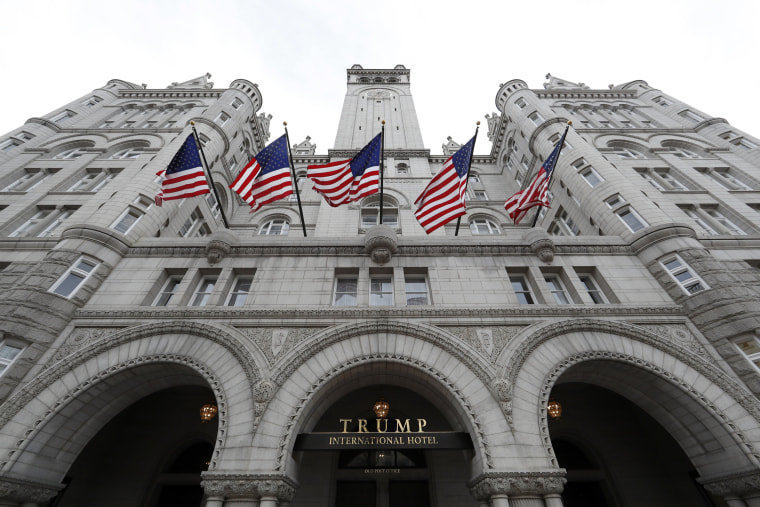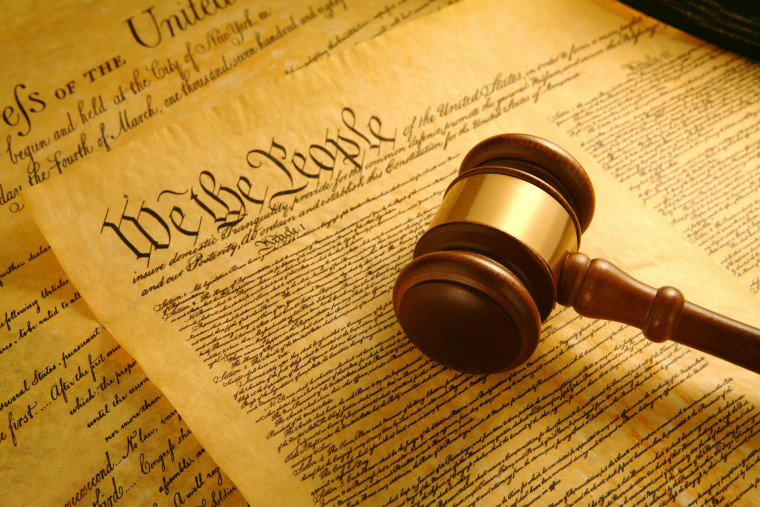President Donald Trump’s business career continues to raise legal and ethical questions, one of which is whether he is in violation of the Emoluments Clause of the Constitution.
The clause, which forbids government officials from accepting payments and gifts from foreign governments, raises the question of whether the president is allowed to continue collecting profits from a global Trump brand.
On Monday, the attorneys general of Maryland and the District of Columbia announced that they will file a lawsuit against Trump claiming the president "flagrantly" violated the Emoluments Clause by maintaining ownership of his businesses after inauguration — particularly his hotels, which are taking in foreign profits.
The allegation is a hefty one, so let’s break it all down:
What is the Emoluments Clause?
The clause says “No Person holding any Office of Profit or Trust under them [the United States], shall, without the Consent of the Congress, accept of any present, Emolument, Office, or Title, of any kind whatever, from any King, Prince, or foreign State.”
Related: Maryland, Washington, D.C. Attorneys General Sue Trump
It was inserted into the Constitution as a way to prevent sitting leaders from accepting foreign gifts or payments, in order to ensure complete neutrality from outside influence and to prevent even the appearance of corruption.
The clause applies to "all officials holding appointed positions in the Judicial and Executive Branches of the national government," according to the National Constitution Center.
Where does it come from?
The Clause was originally intended to counter the common 17th-century practice of presenting expensive gifts to “departing foreign emissaries or diplomats at the end of their tenure in the host country,” according to the National Constitution Center.
In 1787, Charles Pinckney, one of the Constitution's signers, “urged the necessity of preserving foreign Ministers & other officers of the U. S. independent of external influence,” and he moved to add the clause.
It's a reminder of the framers' tough stance against political corruption, kickbacks, and undue outside influence on the nation's leaders.
What is the basis of the state's arguments against Trump?
In one instance, the Trump International Hotel took in about $270,000 in payments tied to the Kingdom of Saudi Arabia, which is lobbying to pull back a U.S. terrorism law.

Attorney General Brian Frosh of Maryland said the President "pitched Trump International Hotel to foreign diplomats and to government officials" and "appears frequently at Trump establishments using his role as president as a marketing device to raise their public profile. "
"The President is paid by companies owned by foreign governments including China," he said. "He takes money from Saudi Arabia, India, Afghanistan, and Qatar, who own properties in Trump World Tower and pay him charges," he said.
Is Trump in trouble?
That’s unclear.
The Emoluments Clause has not been the subject of much debate or clarification by the courts, largely because it has rarely been an issue.
The definitions of what constitutes a "gift" under the law remain largely unclear.
But what we do know is that this is not the first time Trump has been hit with this kind of legal action.
While the lawsuit would be the first related to Trump's business interests brought by government entities, the nonprofit watchdog group, Citizens for Responsibility and Ethics in Washington, separately sued Trump in U.S. District Court in Manhattan alleging "countless conflicts of interest" in violation of the Emoluments Clause.
What does Trump have to say?
Prior to his inauguration, Trump's lawyers preemptively sought to counter any Emoluments Clause violation by saying that “paying for a hotel room is not a gift or a present and it has nothing to do with an office. It’s not an emolument."
“No one would have thought when the Constitution was written that paying your hotel bill was an emolument," said Sheri Dillon, an attorney for Trump. "Instead, it would have been thought of as a value-for-value exchange; not a gift, not a title, and not an emolument,”
Trump, then president-elect, promised to track and donate all profits from foreign government travel and commerce at his companies to the U.S. Treasury. But NBC News and MSNBC reported last month that the Trump Organization hasn't been tracking all possible payments it receives from foreign governments, which could potentially bolster the legal argument an Emoluments Clause violation.
